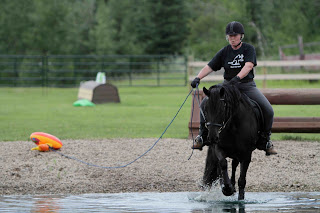Heidi's Top 10 Stewardship Practises. I don't want to tell anyone what to do, or give out free "advice". But, I do want to encourage responsible horsemen to think more deeply. Many people do not think things through, and actually say or influence others with statements that are not accurate. If horsemen took the time to think things through, they may act differently in some situations. Perhaps, these practises which I strive to abide by, may help others develop their own top 10 stewardship practises. So, what does the responsible horsemen do to demonstrate stewardship?
Number 8 - Make the Tough Choices Yourself.
You have accepted responsibility of horse ownership. Swallow your pride when you are in a bind. We all hit the end of our ropes some times. But, we have an amazing resource of horsemen out there to draw from; trainers, riders and professionals in the horse industry. If you are having problems with your horse, get help. Don't let it go to the point where one or both of you get hurt. Hire a trainer, a coach, someone to evaluate your challenge. Get the problem fixed. If the horse is still not suitable for you, find the right person for that horse once the problem is fixed. Be honest. If the horse is indeed unmanageable and not fixable, euthanize it. A trainer told me when I was faced with a difficult decision once, ask five trusted friends, see what they think and then take responsibility. Make a decision in the best interest of the horse. Don't sell it at auction and "hope" someone else will deal with it. This most likely will not happen and the horse will suffer at the end. My philosophy is not to sell the animal to the slaughter industry either, our cattle ranching friends do not need the added disadvantage of an unfair playing field in the food industry. Horses are not raised for meat, they do not undergo the same level of inspections and restrictions the cattle industry has to contend with. And, if you value healthy, uncontaminated food source for people, you should not be supporting horse slaughter. An animal bred and raised for food, is for food. An animal bred and raised for sport and pleasure riding has been given all sorts of drugs and nutritional supplements, and this is not on their feeding record. That is why they should not be a food animal. Support healthy intentionally raised food, not horse slaughter.
Indeed, the horse slaughter industry will have us think we depend on them to help us "get rid of" our unwanted horses. Humanely euthanizing a horse at the farm, and disposing of the body has a cost, but it is about the same as some components of equipment we buy for our animals while we are working with them; I am thinking about the fancy winter blankets, or the memory foam saddle blankets. And frankly, knowing that I was providing leadership for my horse up until the last minute, gives me the feeling of being a professional. I do not want to experience the feeling of guilt that I would have lingering if I had passed my problem onto someone else to deal with.
And remember, ask 5 friends . . . and be creative, there are many ways to solve challenges with horses that do not fit the rider where the horse continues on to be a contributing partner in the right, but different situation.
 |
Yes, all of this takes time. But that is what stewardship is all about.
|


